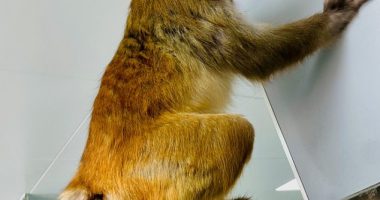.jpg)

They went back and redesigned their Crispr system, using the updated map to steer their edits clear of any essential genes. Then they tried it with embryos again. This time, it worked. But by now it was the summer of 2018; nearly three years had passed. The project was way behind schedule. They had to ask the USDA for an extension on their grant. The long series of setbacks had Owen feeling pretty despondent, wishing he’d never tried his hand at Crispring cattle. His recent success with editing the embryos in a new X chromosome location had reinvigorated him, but that feeling was short-lived. The first batch of edited embryos they transferred into the uteruses of would-be surrogate heifers didn’t take. Of the next batch, five embryos implanted and made it to the early stages of pregnancy, only to be lost a few weeks later.
Owen and Van Eenennaam consulted with breeders and veterinarians about what they were doing wrong. They suspected that the researchers had damaged the embryos in the lab—perhaps during the biopsy, when they pulled off a tiny bit of the embryo to sequence it and determine if the edit took hold. Doing so takes time, and requires freezing the embryos until the results are back from the sequencing lab. Each step—the freezing, the biopsy, the editing—decreases the viability of the embryos.
There was a simpler way to do it. They could attach that fluorescence-producing gene again and shine a flash of UV light on the embryos. A green glow would tell them the edit had worked, no biopsy or freezing required. But that would make those animals transgenic; GFP comes from a species of bioluminescent jellyfish that live in the waters off of Washington state. And that would make them genetically-modified organisms, or GMOs, subject to the FDA’s arduous approval process. The whole point of the project and using Crispr had been to avoid that.
However, the regulatory landscape had changed while they’d been tinkering. In January, 2017, the FDA decided to classify any edited animal DNA as though it were a new kind of drug. That meant any all-male Crispr herd would be subject to the same regulation as first-generation GMOs. And if, in the eyes of the feds, moving cow DNA around was the same as adding a jellyfish gene, the team figured, why not make their lives a little easier? With little hope that any cattle breeders or commercial entities would be interested enough in their SRY knock-ins to bother tangling with the feds, the researchers might as well go ahead with the glowing gene, too.
Van Eenennaam and Owen tried one last time, moving the SRY gene, along with the glowing gene, into about 200 embryos. Since it was their final shot, they decided to make the edit not on the X chromosome, as they had been trying to do, but in a well-established safe harbor site on chromosome 17. Twenty-two embryos survived this process, and of those, nine glimmered under UV light. But only one of them was bright green all over, says Owen. And a month after all the embryos had been transferred into heifers, that bright green one was the only pregnancy that stuck. The research team decided to name the growing calf Cosmo, after a glowing green character in the animated Nickelodeon television series The Fairly OddParents, which aired in the mid-2000s. “I’m obviously too much of a Boomer, because I’d never heard of it,” says Van Eenennaam.
Ultrasound suggested that Cosmo was a male. And when he was born on April 7, that was the second thing the vet checked, after making sure the calf was breathing. “Yep, he has testicles—two of ‘em!” he told Van Eenennaam and Owen. “Phenotypic male, that’s a good start!”








